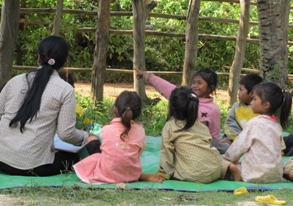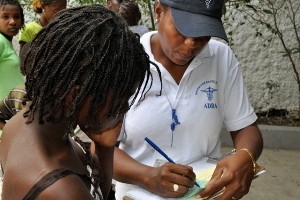To help Cambodia’s youngest children improve their odds of succeeding in school, the Adventist Development and Relief Agency (ADRA) began a project that is helping parents and caregivers develop a supportive environment for their children in preparation for their first year of primary school.
“Our goal is to create an environment where children can reach their full potential in a fun and dynamic atmosphere,” said Ann Stickle, associate director for ADRA Cambodia. “This will contribute to Millennium Development Goal number two, which states that by 2015 children everywhere, boys and girls alike, will be able to complete a full course of primary schooling.”
The three-year A New Day for Kids (ANDK) project will benefit an estimated 3,600 adults and 1,800 children under the age of six, and is in line with the goals of education strategies launched by the Cambodian Ministry of Education, Youth and Sports. It is currently being implemented in the districts of Kravanh and Veal Veng, in the province of Pursat in western Cambodia.
Although Cambodia has made substantial improvements in recent years, the World Bank reports that much work still remains to be done in the country where only 27 percent of school-age children complete the seventh grade.
“Since most children drop out of school in the early grades, a good preparation for school by both children and their parents will increase their success rates,” Stickle continued.
Through the use of Regenerated Freirean Literacy Through Empowering Community Techniques (REFLECT) Methodology, which combines adult education and literacy in a participative manner, ADRA-trained facilitators educate adults on topics such as early childhood care and development, and parenting. ANDK also targets pre-school aged children, utilizing pre-school activities to stimulate children’s imagination, creativity, fine motor skills and hand-eye coordination.
“We aim to improve parenting skills, and provide a sort of on-site laboratory where parents can learn to work with their children during their most formative years,” said Stickle.
ANDK works with the Provincial Department of Women’s Affairs and other government partners as monitors and supporters of the program. With the assistance of village chiefs and leaders, community-based facilitators are selected and then trained in basic community development.
To help them improve their quality of life, participants also receive education in livelihood skills, such as literacy, numeracy, agriculture and livestock management, ultimately benefiting the future of their children.
The project, which is scheduled to run until June of 2011, is funded by the Australian Agency for International Development (AusAID), ADRA Australia, and ADRA Norway.
ADRA International is a non-governmental organization present in 125 countries providing sustainable community development and disaster relief without regard to political or religious association, age, gender, race or ethnicity.


